Top News

December 8, 2011 Kazuki Furugen of Ryukyu Shimpo
The Okinawan Genealogical Society of Hawaii (President Rodney Kohagura), which is made up mainly of Okinawan immigrants, has published a book entitled “Talk Stories 5th Edition 2011.” The book features stories of Okinawan Americans who lived in Hawaii at the time of the attack on Pearl Harbor, and found themselves in the complex situation of being pulled in separate directions by feelings for Okinawa, Japan and the United States. Now that 70 years have passed since the outbreak of war between Japan and the United States, this is very valuable historical material because the number of people still alive who remember the attack is steadily decreasing.

"Talk Stories 5th Edition 2011," a book featuring the experiences of Okinawan immigrants who witnessed the attack on Pearl Harbor in Hawaii.
The Society was established in 1993, and now has more than 100 members. In addition to Okinawan Americans, members include other Japanese Americans who are interested in Okinawan affairs. Affiliated to the Hawaii United Okinawa Association, the society mainly delivers lectures and conducts research about Okinawan genealogy, history and culture, regularly publishing books under the title of “Talk Stories.”
“Talk Stories 5th Edition 2011” consists of two chapters, the first of which features recollections of the attack on Pearl Harbor in 1941. The society conducted interviews with 17 first and second generation Okinawan Americans among its members and recorded their experiences.
The first chapter includes a story in which on the day of the attack on Pearl Harbor, U.S. military forces fired up at incoming Japanese warplanes and some of their own shells fell back to the ground causing a house to burn down. The chapter also introduces the childhood experiences of Okinawan Americans at that time.
Editor-in-chief Les Nakama wrote in the preface that editorial staff were very fortunate to have access to people among the members of the society who had witnessed and survived the attack. He went on to say that they would like to collect more such stories and write them down in documents.
According to Nakama, the book is full of interesting stories about the lives in the Great Depression of those who witnessed and survived the attack. The editorial staff of the book thanked the members of the society who opened up and talked about Okinawa and Hawaii during the war and therefore helped to bring this book to fruition. They said that those experiences would have been lost forever without the help of the society.
(English Translation by T&CT, Mark Ealey)
Go To Japanese
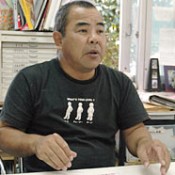
December 6, 2011 Ryukyu Shimpo
Fifty years have passed since December 7, 1961 when a U.S. military jet crashed in Kawasaki, Gushikawa (currently Uruma City). Despite the crash killing two people, injuring at least six others and burning down three houses, the accident was not covered by media to the same extent as the 1959 crash on the Miyamori Elementary School. To create a proper record of what happened and to convey the story to the next generation, Kawasaki Ward is planning to publish written records of local people’s recollections of the accident.
A Kadena-based U.S. Air Force F-100D crashed on the house of Bunkichi Miyagi. In addition to Miyagi, Kame Kamiunten, who was visiting Miyagi’s family from Ishikawa City, was also killed. Burning parts of the jet scattered throughout the area, inflicting burns on residents including children.
Because local people have avoided talking about the tragedy many of the residents of Kawasaki don’t really know about the details. Although holding a 33rd anniversary memorial service for the victims was suggested in the past, it did not happen because bereaved family members said that while they appreciate the kind thoughts they don’t want to recall the tragedy. Few official documents on the tragedy remain.
For the 50th anniversary of the tragedy, plans for a memorial ceremony and written record were again proposed, and an editorial committee was formed on December 1. In the New Year, the committee will start interviewing and gathering photographs. They expect to publish the written record and hold a memorial ceremony sometime between December 2012 and March 2013.
Kawasaki Ward Mayor, Choshin Kokuba, said, “People who remember the past tragedy are still frightened when they see a jet plane fly overhead. It is one important page of Kawasaki history so we should not just let the memory of this accident just fade away.”
(English Translation by T&CT, Megumi Chibana and Mark Ealey)
Go To Japanese
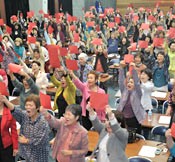
December 8, 2011 Ryukyu Shimpo
A protest rally organized by the Executive Committee of Women was held on December 7 at the Kyoiku Fukushi Kaikan in Naha. Many participants expressed their revulsion towards the injudicious remarks made by former Okinawa Defense Director Satoshi Tanaka and their opposition to the construction of a new base at Henoko. They adopted a letter of protest against the injudicious remarks and demanded that, as an indication to the Okinawan people of genuine feelings of apology, the government cancel its plans to construct a new base plan at Henoko. Approximately 300 people attended the rally, in which they raised red cards in the air, expressing their strong feelings against Tanaka’s remarks.
Suzuyo Takazato, who is co-chair for Okinawa Women Act Against Military Violence, addressed the participants on behalf of the organizers, saying, “The Okinawan governor, the mayor of Nago, the mayor of Ginowan and many other people have spoken out against further construction of bases and they have taken action on this. We must continue our efforts at Henoko and Takae. Former Okinawa Defense Director Satoshi Tanaka’s remarks are a challenge to the voices of opposition of the Okinawan people. We need to be heard and to press hard to stop any new base construction at Henoko, which is ultimately what the former director was aiming for.”
At total of 27 organizations, including local women’s groups, participated in the rally. Representatives of groups voiced their opinions angrily and vehemently, making statements such as, “The removal of the military bases on Okinawa is the only way to relieve our pain.” Rejecting any involvement in United States led wars, Henoko resident Etsumi Taira said, “The U.S. military carries out training on Okinawa in order to kill people. We don’t want people to be killed in places like Iraq or Afghanistan. We want to live together without people having to be killed.”
In the protest letter, the participants stated that, “The former Okinawa Defense Director’s remarks are a reflection of the long-standing government policy of forcing bases on Okinawa,” and that, “The government pretended to apologize to women and to the people of Okinawa, but it is trying to disguise the discrimination that exists against Okinawa.” With that, they called for the cancellation of the plan to build a new base at Henoko. Copies of the protest letter will be sent to the Prime Minister, the Chief Cabinet Secretary, the Defense Minister, the Foreign Minister, the Minister of State for Okinawa, the Cabinet Office Minister Extraordinary and the President of the United States.
(English Translation by T&CT, Mark Ealey)
Go To Japanese

Go To Video
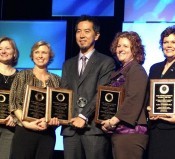
December 4, 2011 Sadao Tome correspondent of Ryukyu Shimpo
Yo Azama, a 41 year-old Japanese teacher from Tomishiro City currently working at North Salinas High School in Salinas, California, was named as the National Language Teacher of the Year by the American Council on the Teaching of Foreign Languages (ACTFL) which is based in Virginia.
Azama was chosen from 6500 foreign language teachers, and was lauded by the ACTFL for his unique method of teaching Japanese.
The award ceremony took place at the ACTFL’s annual convention held in Denver, Colorado on November 18.
Azama was selected as the outstanding foreign language teacher in California on April 2010, and is very happy to have now received the national award.
Other regional finalists for this year’s national award were a German teacher in Washington, a French teacher in Maryland and a Spanish teacher in Missouri, and a Chinese teacher in Florida, so Azama came first in an internationally diverse competition.
At the ceremony, Azama said, “The world needs people to have a deeper understanding of each other. One student, one colleague, one friend at a time – we are changing the world little by little.” He thanked his students for inspiring him every day.
With regard to the future, Azama said, “I expect to have a busy schedule in 2012. I will devote myself to delivering lectures all over the United States and participating in workshops. First of all, we teachers need to reaffirm the importance of improving the quality of teachers, and teaching foreign languages and foreign culture in order to educate students to take their place in a global community.”
Azama graduated from Okinawa Prefectural Tomishiro Minami High School and went to the United States 17 years ago after acquiring a Bachelor of Arts in Music from Showa Academia Musicae in Kanagawa. He graduated from California State University in Monterey Bay and then started teaching.
For 16 years he has been teaching at elementary schools, junior and senior high schools, and since 2000 he has taught Japanese at all levels at North Salinas High School.
Azama’s hobbies are playing the jazz piano, surfing and hiking. He has published several books in the field of Japanese language education.
His mother, Keiko Azama, and his niece, fifth-year student 11 year-old Kanon Azama of Takara Elementary School, went to the United States to celebrate Azama’s winning this award.
(English Translation by T&CT, Mark Ealey)
Go To Japanese
December 6, 2011 Ryukyu Shimpo
Barney Frank, a leading Democratic Congressman was quoted in the U.S. magazine “Foreign Affairs” (December issue) as saying, “I do think we could remove the Marines from Okinawa; whose only purpose has been to destabilize Japanese politics, so when the first alternative government to the conservative regime got elected, we caused them trouble.” He is known to have advocated the withdrawal of the U.S. Marines from Okinawa.
The remarks of such an influential congressman, who also suggested that the Marines in Okinawa are a factor destabilizing Japanese politics, may serve to intensify the debate over the necessity of the U.S. Marine Corps being stationed in Okinawa.
The Foreign Affairs Magazine reported on the keynote lecture delivered by Frank, and the question and answers with him, at the Council on Foreign Relations on November 14 in New York.
Regarding the strategic objective of the Marines in Okinawa, Frank said, “I mean, they don’t know what — so I guess the strategic purpose we’re told is we have to contain China. And I think we overdo that.” He questioned to the need for Marines being stationed in Okinawa, stating, “Again, I do not think that China is prepared to commit economic suicide by shutting down the sea lanes.” In addition, with regard to the U.S. military presence in Asia, he suggested that there is a legitimate strategic interest in deterring North Korea and in providing Taiwan with some assurance, but he added, saying, “I think the current presence is at least as much as we need, maybe a little more .”
With regard to the new Hatoyama administration’s policy which had the place for the relocation of the Futenma Air Station to be outside the prefecture or out of the country, he said, “One of the biggest problems they had was that they had promised to ask America to leave Okinawa, and the American government refused and very much destabilized that government.” This leading congressman suggested, “I think if we did it in the right way and noted the 7th Fleet was still there, that they might be a little bit upset but it would certainly have no negative consequence on us.”
Frank has a strong influence on the U.S. government’s monetary policy. To look for more ways to trim the military budget, in May 2010 Frank set up “The Sustainable Defense Task Force” convened by a bipartisan group in Congress, and identified nearly $1 trillion in potential cuts, including a reduction plan for U.S. forces in Asia over the next decade. In July that same year, he adopted the stance that the Marines being stationed in Okinawa is unnecessary. “We don’t need 15,000 marines in Okinawa – they’re a hangover from a war that ended 65 years ago,” Frank says.
(English Translation by T&CT, Mark Ealey)
Go To Japanese
December 6, 2011 Tsuyoshi Arakaki of Ryukyu Shimpo
The 5th Worldwide Uchinanchu Festival Executive Committee announced that the official number of participants from outside Okinawa who attended the festival in October was 7363, an increase of more than 2400 people, or 1.5 times the number who attended the previous festival in 2006. The number includes 5317 people from abroad, an increase of 924 people over 2006. Both of these numbers were the highest to date. Although many people of Okinawan descent living abroad were concerned about radioactive pollution following the accident in March at the Fukushima No. 1 Nuclear Power Plant, people came to understand that one of the aims of the festival was to support those affected by the Great East Japan Earthquake, and this resulted in an increase in the number of participants.
“Helping someone when they are in really in need – this is the way it is in Okinawa. I also sense chimugukuru at work here (trans: Doing a good deed without expecting anything in return). In 2001, people talked of calling off that year’s festival because of the September 11 terrorist attacks in the United States, but we got through that and made a success of it,” said festival organizer Hajime Terukina as he thanked those people of Okinawan descent who came.
At the 5th Worldwide Uchinanchu Festival held over four days from October 13 mainly at the Okinawa Cellular Studium Naha the commitment was reaffirmed to pass on and promote the Uchina network and Uchina identity to the young generation.
(English translation by T&CT, Lima Tokumori and Mark Ealey)
Go To Japanese
December 5, 2011 Ryukyu Shimpo
On December 4, the inaugural meeting of the Peace Studies Association of Japan, Okinawa Research Council, otherwise known as the Peace Studies Association of Okinawa, was held at Okinawa University. The Association was established to restructure peace education and strengthen links among scholars, teachers, and civic associations conducting research on peace-related issues in Okinawa.
While there is a growing interest in issues related to the relocation and return of the Futenma Air Station and the screening of school textbooks that described events that occurred in the Yaeyama Islands, some people suggest that interest in peace education is waning. The Association intends to collaborate with educators in schools, universities and community-based organizations to support and cultivate peace education practitioners and young researchers, and hopes to help revitalize the peace movement in Okinawa.
Professor Hiroshi Nakachi, who specializes in administrative law and is currently the vice-president of Okinawa University, was appointed as the president of the Association. The president and the Association’s head office will be rotated annually among universities in Okinawa, and a conference will be held once a year.
At the meeting, Nakachi said, “Dealing with peace studies is something that teachers and researchers of Okinawa must do. We need to think about how we can widen the networks involved in these studies and reach to more schools. Let’s work hard together on this.”
(English translation by T&CT, Shinako Oyakawa and Mark Ealey)
Go To Japanese
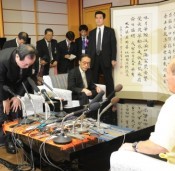
December 3, 2011 Ryukyu Shimpo
In the evening of December 2, at the Okinawa Prefectural Office, Defense Minister Yasuo Ichikawa met with Governor Hirokazu Nakaima to discuss the injudicious remark by Satoshi Tanaka, the director-general of the Okinawa Defense Bureau on November 28, about the submission of the environmental impact assessment for the relocation of Futenma Air Station to Henoko, in Nago. Ichikawa apologized to the governor, saying, “It is an inexcusable remark and a grave breach of moral standards. It has offended the people of Okinawa. In my role as the head of the Ministry of Defense, I would like to apologize to the governor.”
Governor Nakaima expressed strong discomfort, saying, “His remark offended the dignity and feelings of the people of Okinawa. I am very angry about this. It is extremely, … extremely regrettable.”
With regard to the matter of the rape of a young girl by U.S. military personnel in 1995, on December 1, in response to questions at the Upper House Special Committee on East Japan Great Earthquake Reconstruction, Defense Minister Ichikawa stated, “I do not know the full and accurate details of this.” He apologized to the governor for this, saying, “I thought that I should not be explaining that case in detail in a place such as the Diet. I apologize for that.” “I am aware that it was a tragic incident,” he added.
With regard to the dismissal of the former chief of the Okinawa Defense Bureau, Nakaima said, “We are grateful that the government responded so quickly.” However, he added, “There is quite a serious situation here that really does require you to do your utmost to regain the trust of the people of Okinawa. I would like you convey this to the Prime Minister.” Requesting that the central government strive to rebuild the trust of the local people, the governor brought the meeting with the defense minister to a close after about eight minutes.
At his press conference held at Jichi Kaikan Hall, in Naha, after his meeting with the governor, Defense Minister Ichikawa stated, “Inappropriate remarks are a serious issue for us. I will do my best to ensure that there are no negative effects for Defense Ministry staff and Self-Defence Force personnel here in Okinawa in terms of them carrying out their duties. We will move forward, step by step to regain the trust of the local people.” He stressed that all those in the Defense Ministry will strive to restore confidence of the people of Okinawa. In response to a question asking if the recent injudicious remark might impact upon the submission schedule for the environmental impact assessment, he avoided making a comment, saying, “I am not going to comment on this here, at this stage.”
After his meeting with the defense minister, Nakaima stated, “It will be a tough challenge for the government to regain the trust of the people of Okinawa, and it will take some time. People’s feelings of anger about it are not easily placated.”
(English translation by T&CT, Mark Ealey)
Go To Japanese

Go To Video
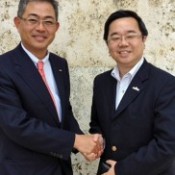
December 4, 2011 Ryukyu Shimpo
Haiteng Chen, Chief Executive Officer of Baidu Japan Inc. visited Okinawa from December 1 to 3, for meetings with leaders of the prefectural government and representatives of local companies. Baidu Inc. (President Alan Zhang) is a Chinese web-services company that boasts an 83% share of the Internet search market in China.
With regard to tourism in Okinawa, Chen said, “The introduction of multiple-entry visas for inbound Chinese tourists means that there is great potential for the Okinawan tourism industry. However, these tourists tend to see Okinawa as a stopping point, which does not really generate much benefit for the local economy. Measures need to be implemented specifically to attract Chinese tourists.”
Okinawa is the first place in Japan that Chen has visited to consider the situation since the setting up of an agreement between Baidu Japan and Mizuho Bank to cooperate in order to acquire Chinese customers and Chinese market development. He met representatives of about 20 organizations, including local companies, people from the Okinawa Prefectural Office and the Okinawa Convention & Visitors Bureau.
Ahead of the 40th anniversary of the normalization of diplomatic relations between Japan and China, and the 40th anniversary of the 1972 reversion of Okinawa to Japan, Chen explained the services provided by Baidu Japan since the introduction of multiple-entry visas for Chinese tourists and the arrangements needed for the establishment of direct flights from Beijing to Naha.
Chen, who studied at Okinawa International University for two and half years, is emotionally attached to Okinawa, saying, “This is my second home. Okinawa can make the most of my being a Welcome to Japan ambassador for The Ministry of Land, Infrastructure and Transport.”
With regard to how Chinese people view Okinawa, Chen said, “Okinawa is surrounded by beautiful sea, but the presence of the U.S. military bases has been widely covered by the Chinese news media, and that puts many Chinese people off coming.”
Maldives is the most popular foreign destination for Chinese people as a location for resort weddings.
Chen said that in terms of popularity ratings in China, Okinawa competes with Hokkaido and Jeju Island in South Korea, and he emphasized that Okinawa needs to work out a strategy to create a point of difference when compared with locations in other countries.
Japanese companies are now registering themselves in Baidu’s paid search listings, allowing their addresses to appear on the search results pages of Baidu. It is reported that since the last fiscal year, thanks to Baidu’s paid search listings Rakuten Travel has improved its performance in the number of hotel reservations in China by eight-times.
(English Translation by T&CT, Mark Ealey)
Go To Japanese
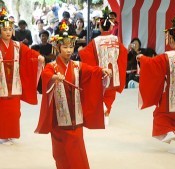
December 2, 2011 Ryukyu Shimpo
On December 1, a traditional performing art for the dedication of the Tanadui Festival, which has been designated as an important intangible cultural property by the Japanese government, commenced at Yomochi-utaki on Taketomi Island. The island was crowded with many visitors from near and far who had come to see the traditional performing arts that dates back more than 600 years. The performances will be held until December 2, featuring about 70 dances and kyogen plays. Because the lunar Bon Festival conflicts with Shichi (a festival on Iriomote Island) this year the event was held in December for the first time in 80 years.
The Tanadui Festival is held to pray that seeds that have been sown grow successfully. The traditional performing arts are the most exciting event of the 10-day festival. On the first day, the various performances continued from 9:30am through to the evening.
(English translation by T&CT, Lima Tokumori and Mark Ealey)
Go To Japanese
December 2, 2011 Ryukyu Shimpo
In the main competition of the Tallinn Black Nights Film Festival, an international film festival held from November 16 to 30 in Estonia, Cocco, an artist from Okinawa, has won the first Jury Prize For Outstanding Performance and Cinematic Language in the movie KOTOKO, directed by Shinya Tsukamoto. According to distributing agency MAKOTOYA Co., Ltd., the prize was established especially for the movie KOTOKO. The convincing performance by Cocco was highly acclaimed by the judges, who decided that her efforts fell outside the boundaries of existing awards.
Most of the works screened at the Cannes and the Venice Film Festivals were also shown in Estonia, at what is now the leading film festival in Eastern Europe. The official Competition EurAsia, which is the main event in which Asian and European films compete for awards, featured a total of 18 works.
The movie portrays a single mother who does her best to bring up her family but suffers from double-vision and repeatedly indulges in self-harm. It depicts the difficulty and preciousness of life. The film will be shown from April 2012 in Tokyo and after that will be screened at Sakurazaka Theater in Naha. It received the Orizzonti Award for the best movie in the 68th Venice International Film Festival in September, and was shown officially at the 15th Oslo International Film Festival in Norway in November.
(English translation by T&CT, Lima Tokumori and Mark Ealey)
Go To Japanese










 Webcam(Kokusai Street)
Webcam(Kokusai Street)


